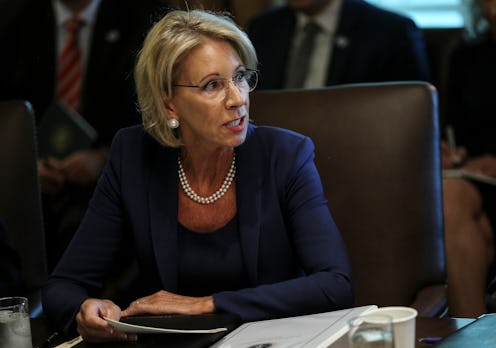News
Betsy DeVos Is Considering New Campus Sexual Assault Rules To Protect The Accused

The Trump administration is working on codifying how it believes institutions of higher education should handle reports of sexual misconduct. A new proposal obtained by The New York Times indicates that Education Secretary Betsy DeVos may propose new college sexual misconduct policies that could protect college staff from legal repercussions and further shield those accused of sexual assault and harassment.
The proposed rules will be subject to a public comment period, but if they are approved, will "have the force of law," per the Times. They do not require congressional action to be put in place.
Nearly a year ago, DeVos announced that she was peeling back Obama-era guidance that outlined how school administrators should handle sexual assault. The Obama guidance required school to default to the lowest standard of proof, aka "preponderance of evidence," when deciding whether or not an alleged perpetrator should be punished for sexual misconduct. After peeling back that guidance, DeVos said that schools should be able to revert to a higher evidence standard, making it more difficult in some cases to find alleged perpetrators guilty.
The policy proposal the Times obtained could seriously impact the ways that colleges approach reports of sexual misconduct. They would allow schools to choose which level of evidence to rely upon when investigating misconduct cases, would more narrowly define sexual harassment, and would only hold schools accountable only for sexual misconduct complaints which are formally filed, according to the Times.
If these exact policies were put in place, they could also affect how colleges internally litigate sexual misconduct complaints, including allowing alleged victims and their alleged assailants request evidence from one another, as well as granting each side the option to cross-examine one another. Both parties would have access to any evidence submitted, regardless of whether it is on deck for use.
"We are in the midst of a deliberative process," Department of Education Press Secretary Liz Hill tells Bustle in a statement. "Any information the New York Times claims to have is premature and speculative and therefore we have no comment."
It's important to remember that the potential policy changes are not set in stone. The proposal obtained from by the Times could change before being formally presented, and potentially changed again after a public comment period.
DeVos has in the past faced criticism for supporting certain sexual misconduct policies and guidance. Critics have argued that DeVos bolsters policies which make it more difficult for alleged victims to prove that they were assaulted or harassed. They have also argued that certain changes to college campus sexual litigation processes could scare alleged victims from coming forward at all.
How to tackle sexual assault on college campuses has been a divisive issue for decades, and though there have been waves of various guidelines and policies, many schools also maintain their own unique channels for processing complaints. Though these federal policy drafts have not been formally submitted to the public, if and when they are, if they are presented as reported by the Times they will undoubtedly be subject to intensive public debate, both inside and outside of the academy.